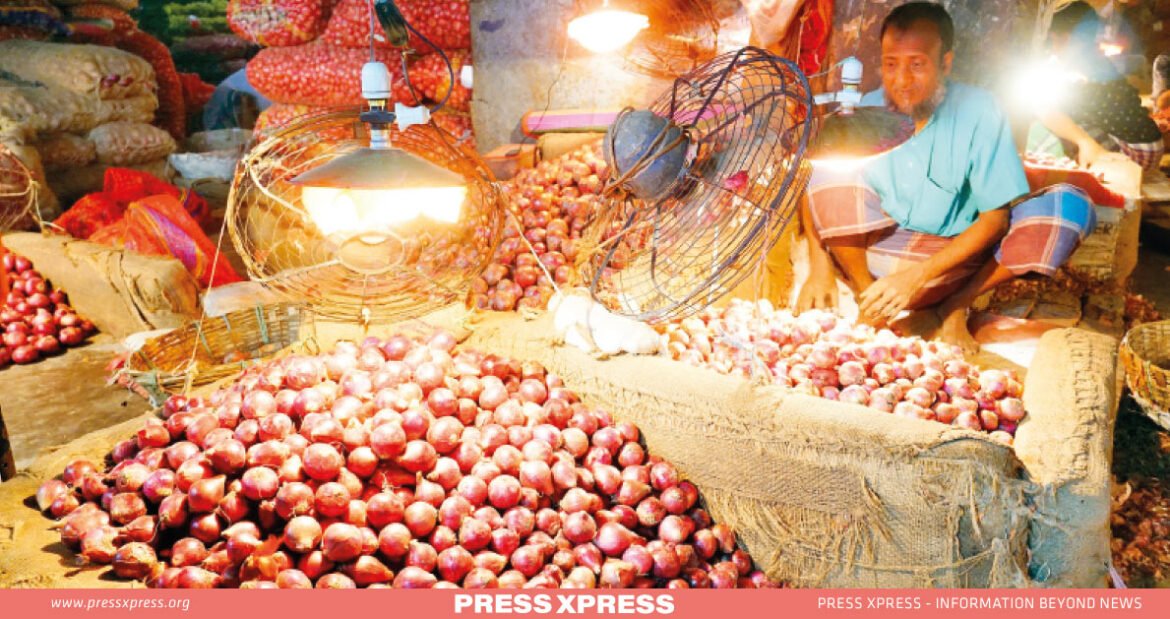The holy month of Ramadan brought much-needed relief for consumers in Dhaka as onion prices saw a significant drop of 30 taka per kilogram. This respite came after a period of rising prices ahead of Ramadan which was causing pressure on consumers. Multiple factors led to the decrease in prices. Local produced supplies as well as import initiatives from India have greatly contributed to the sudden drop.
Factors that Led to Decrease
The primary cause of the reduction in prices can be traced back to Faridpur District- colloquially known as the onion capital. Farmers had begun planting the Hali variety onion on a massive scale across 11,000 hectares of land in Saltha, Faridpur district during January. With farmers anticipating high profits as prices surged in the kitchen market. This price reduction is particularly dramatic if one considers that merely a month ago, prices of onions were 171.43% higher than in the same period in 2024. In 2019, the price of onions reached a peak of Tk220 per kg, setting a record high in the country’s history.

Pabna also played a crucial role, as it too is known for its significant capacity to produce onions. As harvest season for both regions coincided and a large supply of onions hit the market; prices dropped. The government’s decision to import onions from India also played a crucial role, as the recent import of nearly 50,000 tons of onion was specifically taken to ease the burden of rising prices in the onion market. On March 2nd, the state minister for commerce, Ahasanul Islam Titu, stated that the imported onions would arrive ‘this week’ and would hit the markets soon, stabilizing prices. His prediction, it would seem was correct.
You Can Also Read: Awami League sets example of Devotion with Low-Cost Market for Ramadan
According to some farmers and wholesalers, a group of unethical traders deliberately stockpiled onions in anticipation of higher prices during the Ramadan period. Now, those stored onions are being released into the markets, coinciding with the arrival of the new variety. This influx of supply from both the stockpiled and freshly harvested onions has caused an increase in availability, leading to a reduction in onion prices. The likely release by hoarders is due to the news that cultivated and imported onions were hitting the market; causing them to realize the futility of hoarding.
Indian Onion Export is of Geopolitical and Local Social Significance
A particular note should be added here that India’s decision to export onions to Bangladesh was an exception by the nation. India has allowed onion exports to certain countries, including Bangladesh, on a government-to-government basis. India, the world’s second-largest onion exporter, imposed a ban on onion shipments from December 2023 to March 2024 due to domestic price hikes and potential shortages.
Fluctuations in the pricing of onions played a crucial role in influencing the outcome of India’s national election held in 1980, as well as two state-level elections conducted in 1998. The volatility in onion prices emerged as a determining factor that swayed voters’ decisions during these electoral processes.
The fact that India made an exception for Bangladesh regarding onions, during the election year, is a powerful sign of the level of cooperation the two nations enjoy. While no definitive proof exists, it could also be an indicator that the ‘Boycott India’ movement has not gathered any significant following in Bangladesh; as consumers seem to be happily purchasing onions at lower prices, regardless of their source.
Relief During Ramadan
During the holy month of Ramadan, onions have a culturally significant role in the traditions of Bengali people. As families gather to break their fasts, onion-based food items such as ‘boras and piyajus’ are common and staple items.
The decline in onion prices during Ramadan can greatly ease the financial strain on households. With onions being a fundamental ingredient in many dishes prepared during this time, lower prices mean that families can maintain their traditions and culinary practices without the stress of inflated costs.
To ensure the stability of onion prices and other essential commodities, the government can play a powerful role through several measures. The following are the steps, the Government can take to further stabilize prices:
- Enhancing Storage Facilities: Improving storage infrastructure to reduce wastage and ensure a steady supply throughout the year.
- Market Intervention: Releasing onions from buffer stocks to stabilize prices during periods of shortage.
- Import Relaxation: Facilitating further import of onions by relaxing phytosanitary requirements and other import restrictions to increase supply.
- Import Diversification: Importing from multiple sources to reduce dependency.
- Export Regulation: Adjusting export policies, such as lifting bans when domestic supply is sufficient, to prevent market glut and price crashes.
- Price Monitoring: Strengthening surveillance mechanisms to prevent hoarding and speculative pricing.
- Support for Farmers: Providing subsidies or incentives for onion cultivation to encourage production and ensure fair prices for farmers.
- Consumer Awareness: Running campaigns to inform consumers about price trends and alternative options during price hikes
Furthermore, the role of TCB must also be stated due to their contribution to relieving the burden of the lower income classes of society.
As the month of Ramadan enters its third week, the combination of stable onion prices and the government’s proactive measures contributed to a sense of economic stability, allowing families to fully commit themselves to the spiritual and communal aspects of the observance.


